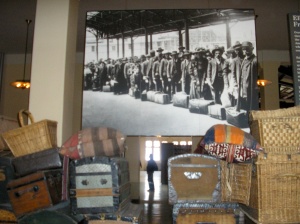The Lunar New Year has me thinking about endings, beginnings — and cycles that don’t really have a beginning or an end.
My career as a newspaper reporter is over, and given the violent contractions that American newspapers experienced in 2008, many believe we’re witnessing the end of an era of the entire industry. Should I be relieved I got out when I did? There are times I can’t help but feel as if I moved out of town just before an earthquake hit.
I always had a love-hate relationship with daily journalism. When it was good, it was exhilarating to have a job that allowed me to learn something new week in and week out, to have the responsibility and privilege of framing an issue or an event. What I loved most was when fascinating people not only let me into their lives, but let me into their lives knowing that I was a reporter and would be writing about their aspirations and their darkest demons.
When daily journalism was bad, it was soul-suckingly bad — the long hours, the loved ones you neglected again and again. And for what? So that you could bust your ass for a story that maybe 25 people read? So that you chose your battles with editors, and still lost the ones that mattered most to you? I saw all the little and big sins committed in journalism — sometimes out of necessity, on occasion probably out of intent, but overwhelmingly because reporters and editors and photographers and copyeditors work on a deadline with limited resources.
I volunteered this year to proctor the writing exam that applicants to Columbia University’s Graduate School of Journalism are required to take as part of the admissions process. The J-School is where I started out in the magazine concentration and ended up being drawn instead to the newspaper track. A newspaper was pretty much the last place I ever saw myself working. I didn’t think I worked fast enough or acted gutsy enough to cut it in the daily grind — and maybe that’s exactly what drew me to the field.
After the final set of applicants took their tests this weekend, I realized I was both inspired and reassured that there are still people out there who want to study journalism. Surely, they’ve read about the unsustainable business models. Given all the layoffs and furloughs, they must know they’ll have greater job security, and can make a lot more money, in another field. And yet…
The applicants shrugged off all the talk about whether journalists will become irrelevant in a world increasingly populated by bloggers and citizen reporters. They refuse to see death when they look at the news industry — what they discover instead is a once-in-a-lifetime opportunity to be part of a transformation, a new beginning. Even if news is eventually distributed only online and through iPhones, BlackBerrys and Kindles, the impact of the words themselves will still be the same.
***
I think “The Bullets in My In-Box,” a piece in the Sunday New York Times about reporting on the latest war in Gaza, beautifully illustrates why we’ll always need good reporting and good writing — why we’ll always need good journalists. Ethan Bronner, who has written about the Arab-Israeli conflict for more than 25 years, walks us through how a war of language complicates a reporter’s ability to tell a story:
No place, date or event in this conflicted land is spoken of in a common language. The barrier snaking across and inside the West Bank is a wall to Palestinians, a fence to Israelis. The holiest site in Jerusalem is the Temple Mount to Jews, the Noble Sanctuary to Muslims. The 1948 conflict that created Israel is one side’s War of Independence, the Catastrophe for the other.
For every example you can point out about irresponsible journalism, there’s an example like this one — a reporter such as Bronner who has devoted his career to understanding entrenched conflicts. He’s a journalist who understands he must scrutinize his choice of who to interview, which telling detail to use, which example to lead with, which name to use. And he knows that no matter how well he does it, there will be someone criticizing him — and his field.

